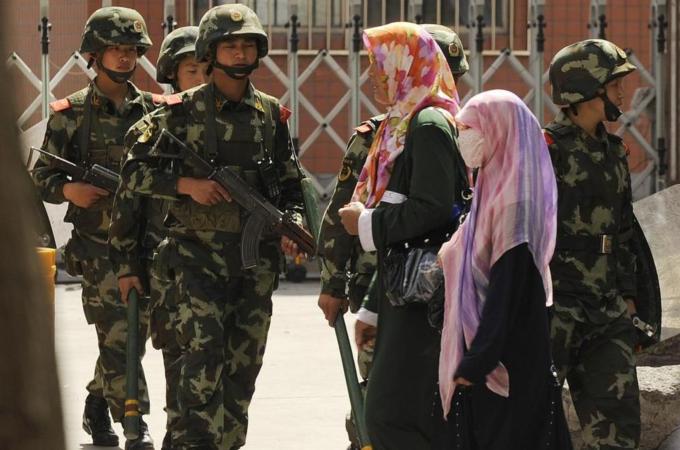Amid a long-running anti-terrorism campaign in Xinjiang, the use of harassment, intimidation, religious discrimination, cutting edge surveillance technology, and political reeducation camps has steadily increased. This has turned the region into what the European School of Culture and Theology’s Adrian Zenz has described as “perhaps the most heavily policed region on the planet.” A new report from Chinese Human Rights Defenders (CHRD) looks at official arrest data from 2017, which shows a substantial increase in arrests in the region, and notes that over 20% of total arrests in China last year happened in Xinjiang, which is home to only 1.5% of the country’s population:
The ratio of arrests made in Xinjiang has increased by 306% in the past 5yrs compared to the previous 5-year period; nearly 70% of the arrests were made in 2017 alone. These numbers are likely related to the government’s “strike hard” campaign @SophieHRW @uyghurproject @gerryshih https://t.co/xPbpoFYXfz
— CHRD人权捍卫者 (@CHRDnet) July 25, 2018
At The Guardian, Lily Kuo excerpts from and summarizes the report, providing context on the situation in Xinjiang amid the terror crackdown:
Analysing publicly available government data, the advocacy group Chinese Human Rights Defenders (CHRD), found 21% of all arrests in China in 2017 were in Xinjiang, which accounts for about 1.5% of China’s population. Indictments in Xinjiang, accounted for 13% of all charges handed down in the country last year.
“For both arrests and indictments, the sudden increases in 2017 from 2016 are staggering,” the organisation said in its report, released jointly with a Chinese group, the Equal Rights Initiative, on Wednesday. “Given that China’s conviction rate is 99.9%, nearly every individual indicted is likely to be convicted.”
[…] Human rights groups say the crackdown has gone too far. Controls over religious and cultural expression have increased under hardline communist party secretary, Chen Quanguo, drafted to Xinjiang in 2016. Those under the age of 17 are forbidden to enter mosques or make unauthorised pilgrimages to Mecca. Islamic names, beards, face veils, and long skirts have reportedly been outlawed.
Advocates and researchers say at least tens of thousands of minorities, mainly ethnic Uighurs, have been detained in “re-education” camps where they can be held indefinitely. In April, a group of US lawmakers called the camps, “the largest mass incarceration of a minority population in the world today.” […] [Source]
On Twitter, BuzzFeed’s Megha Rajagopalan notes that the many ethnic Uyghurs, Kazakhs and Kyrgyz being detained in the reeducation camps are not represented in the data CHRD analyzed, as these camps are extra-legal:
Context for this already shocking statistic — the "reeducation" camps in Xinjiang are not part of the penal system, so figures on criminal arrests don't even include the hundreds of thousands of Uighurs detained in those places, usually without documentation issued to families. https://t.co/pA1NAgLTxi
— Megha Rajagopalan (@meghara) July 25, 2018
The conditions inside these political re-education camps—whose existence authorities continue to deny despite a mounting collection of evidence—have been described in detail by Dr. Zenz and the AP’s Gerry Shih. At The Conversation, Australia National University’s Michael Clarke puts the camps into the context of Beijing’s wider goals for the region and for national ideological work:
[…R]e-education camps have emerged as a repugnant but depressingly logical extension of this process. The government calls them “transformation through education” centres, which harks back to the institutions of “thought reform” established under Mao Zedong in the 1950s.
Those camps sought to “transform” and “rehabilitate” prisoners through such tactics as patriotic indoctrination, self-criticism sessions and forced labour. A similar theme can be seen in the current re-education camps in Xinjiang, where detainees are forced to sing patriotic songs, take part in self-criticism sessions and sit through lectures on Xi Jinping “thought”, Chinese language, Chinese law and the dangers of Islam.
The objective is to dilute Uyghur cultural identity and, in Xi’s words:
enhance their sense of identity with the motherland, the Chinese nation, Chinese culture, the CCP and socialism with Chinese characteristics.
These camps are an extreme symptom of Xi’s commitment to return Communist ideology to centre stage in China.
This began shortly after Xi assumed the presidency in 2013 when he launched the “Seven Perils” campaign to combat so-called subversive ideas. This targeted things like Western constitutional democracy, universal values of human rights and press freedom. […] [Source]
Chinese legal expert Jerome Cohen this week posted his recommendations for external actions towards ending “Xinjiang’s horrific detentions.” On his list was the American use of Global Magnitsky Act sanctions against responsible parties, a topic covered in greater detail by CDT earlier this week. Ranking members of the U.S. Congressional-Executive Commission on China in April called on Ambassador to China Branstad to gather information in consideration of levying Magnitsky sanctions.
CHRD’s report, as well as mounting criticism from abroad of the ongoing detention of ethnic minorities in the reeducation camps, comes ahead of a U.N. review of China’s compliance with the International Convention on the Elimination of All Forms of Racial Discrimination, which will begin on August 10. Human Rights Watch last month published relevant context and recommendations ahead of the review.
https://twitter.com/donaldcclarke/status/1022154986451550208
Was telling two of my dearest friends about what's happening to #Uighurs in #Xinjiang & beyond the other day. Before I could finish listing the atrocities in the broadest strokes, the elder Jewish gentleman said, "that's genocide", & his wife nodded in agreement. #CallItByItsName https://t.co/1F4KHoAluW
— Yangyang Cheng (@yangyang_cheng) July 25, 2018







